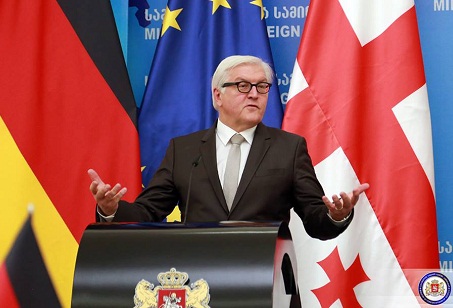Steinmeier: Germany supports Georgia's European future

German Foreign Minister Frank-Walter Steinmeier pledges to "actively” support Georgia’s European choice, as the country’s Government keeps "productively” following the European way.
Steinmeier is on a two-day working visit to Georgia. Today he met his Georgian counterpart Tamar Beruchashvili. The pair discussed bilateral relations, Georgia’s European perspective, Russia’s aggressive moves in Georgia’s breakaway regions as well as possible ways to solve the Ukraine crisis.
The German Minister, who first visited Georgia in April, stressed relations between the two countries was closer this year than ever before.
Beruchashvili thanked Steinmeier for Germany’s role in developing Georgia’s human capital by letting more than 2,800 Georgian students study in German universities. The sides announced 2017 would be a Georgia-Germany friendship year.
Meanwhile, they signed an agreement today that will foresee the Georgian side provide the German side with a piece of land in Tbilisi where a German International School will be built.
European future
At the Ministers’ joint press conference after the meeting, Steinmeier said the European Union (EU) Association Agreement (AA) was a very voluminous document, which included modernisation and reformation of Georgia.
He noted time and energy were needed in order to make the Georgian people feel the real benefits of the deal.
"Germany is trying to do it along with Georgia,” the German Foreign Minister said, adding the AA was not the only document the Georgians were going to enjoy.
"The visa liberalisation process is underway and just one step is left until the visa-free travel between the EU and Georgia,” Steinmeier said.
"This process is irreversible. Georgia has taken its obligations, which should be implemented now.”
However, Steinmeier said Georgia-Germany relations were intensive not only because of the AA deal, but because of "many other reasons” too. He named the country’s improving investment environment and reform simulation as an example.
Closer ties with NATO
Steinmeier said beliefs that Germany had a "conservative approach” towards Georgia’s NATO-membership was wrong.
"The German Government unconditionally supports the decision made at the Bucharest Summit [about helping Georgia prepare for membership],” he said, adding the Wales Summit was a continuation of this process.
"Germany was the initiator of the Substantial Package NATO proposed for Georgia. I think, everything goes logically from the political point of view, I do not feel that this is a conservative process.”
The German diplomat touched upon Georgia’s "successful” participation in the NATO peacekeeping mission in Afghanistan and expressed his satisfaction about Georgia’s readiness to take part in post-ISAF activities too.
Breakaway regions
Germany does not recognise the so called treaty on 'Alliance and Strategic Partnership' between Russia and Georgia’s breakaway Abkhazia region, Steinmeier said.
"We have repeatedly said that Germany supports Georgia's territorial integrity and sovereignty, and I confirm this once again. I do not recognise this agreement,” he stated.
Meanwhile, Georgia's Foreign Minister expressed hope that Germany would support Georgia to mobilise the international community regarding this "alarming” issue.
"Our concern is increased by the fact that Moscow is also planning to sign a so called treaty with the Tskhinvali puppet regime too in the context of broader integration in the near future,” Beruchashvili said.
She noted Tbilisi saw the German Foreign Minister’s visit as a manifestation of political support and solidarity with Georgia.
Ukraine conflict
Steinmeier said Germany was trying to do what it could to contribute to regulate the Ukraine crisis, regarding to which Georgia also had "big concerns”.
"From my negotiations held in Kiev and Moscow, Vienna and Basel, I can say there might be a small sign that gives us a reason to calm down slightly,” he said, adding everything was being done in order to end the killing of innocent people.
The German Foreign Minister believed a demarcation line needed to be set up in Ukraine, where heavy machinery and soldiers would back off.
"I think we should manage to do this,” he said.
"Probably, a buffer zone will be created there. Everyone should take responsibility to contribute to fulfilling the agreement.”
The German Foreign Minister was set to leave Georgia tomorrow. Before leaving, he will meet Georgia’s President and Prime Minister.
 Tweet
Tweet  Share
Share